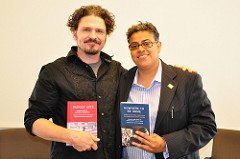
Our Community
Interested in learning more about Voice of Witness’s work? Check out their upcoming Voices From Burma event in New York City or their Inside this Place, Not of It event in San Francisco.
 This past August, the acclaimed author and educator Dave Eggers—best known as the author of seven books including What is the What, as well as the founder of both McSweeney’s and 826 Valencia—visited the Tides Learning Community for a conversation with Tides CEO Melissa Bradley. Eggers focused on a more recent project called Voice of Witness, a nonprofit book series that depicts human rights crises around the world through the stories of the men and women who experience them. The series covers hot topic issues ranging from immigration and wrongful conviction, as well as often less-covered stories including the impact of dictatorial regimes on people living in Burma and Zimbabwe.
This past August, the acclaimed author and educator Dave Eggers—best known as the author of seven books including What is the What, as well as the founder of both McSweeney’s and 826 Valencia—visited the Tides Learning Community for a conversation with Tides CEO Melissa Bradley. Eggers focused on a more recent project called Voice of Witness, a nonprofit book series that depicts human rights crises around the world through the stories of the men and women who experience them. The series covers hot topic issues ranging from immigration and wrongful conviction, as well as often less-covered stories including the impact of dictatorial regimes on people living in Burma and Zimbabwe.
Below are some of the highlights from their conversation, as well as the lively Q&A that followed. And check out our slideshow below.
How do you decide what projects to do?
In a nutshell, Voice Of Witness aims to cover under-reported, ongoing, contemporary human rights crises. These are often not “issues” yet within nonprofit/philanthropic sectors, or are issues that haven’t yet received a groundswell of publicity. As a result, our narrators are often some of the most marginalized voices in their local and global communities.
In terms of how we choose project, at this point, we accept proposals from editors. Sometimes we identify an issue and then seek out an editor, but we tend to prefer if editors come to us about a subject they are already passionate and knowledgeable about.
How does Voice of Witness intersect with your work at 826 Valencia?
Voice of Witness works with members of the educational community, including teachers affiliated with 826 Valencia. We hold readings and periodic info sessions for teachers at 826 Valencia. The team of high school students from 826 that work on The Best American Nonrequired Reading (BANR) also come into contact with our work. Each year, students in the BANR class read from our most recent titles. In fact, this year, the only piece unanimously voted for inclusion in the BANR anthology by students was an excerpt from Voice of Witness’s latest title Patriot Acts.
What projects will Voice of Witness tackle in the future? And what projects are you working on now?
Current projects we are working on focus on displaced persons in Colombia, Chicago public housing, and global labor rights. There has been discussion of book tackling issues surrounding gender violence (including global LGBT rights) but there isn’t anything super solid yet. Our next book—out this October—is called Inside This Place, Not Of It: Narratives from Women’s Prisons.
What is the experience like for the narrators who tell their stories?
It is empowering. Being interviewed offers narrators the power of feeling listened to and getting to give testimony. Here are some testimonials from narrators who appeared in the book Underground America:
Roberto: “It was a relief. I released something from inside of me…you feel that you’ve let go of something stressful… that something has left you. I feel more useful now. When I let go of everything, I felt like everything had left. You feel more sure of yourself. Without worry, without concern. Like, one piece at a time, you’re lightening the burden you’ve always been carrying on your shoulders. I’m left more relaxed, more tranquil. And we’re more prepared to continue onward.”
Lorena: “Being able to tell my story has provided me with a sense of existence that I didn’t have before. I’ve lived my life hoping I could inspire or motivate just one person. Having my story published has ensured that my experiences, struggles, and most importantly, victories are testaments about the power each person possesses within. Regardless of your ethnicity, socio-economic background, or legal status, you can be part of something amazing. I am proud to have come out of “the shadows” and hope that it inspires others to do the same and remind them to never doubt that a single person can change the world.”
How can we do a better job of bringing storytellers into the social justice movement?
One of the ways we really hope to do this is through our education program—through work with teachers, community activists, artists and even foundations. We recently consulted with the Evelyn & Walter Haas, Jr. Fund to help them use storytelling in their work for social justice.

Read the stories and hear the voices of social change leaders fighting for justice.